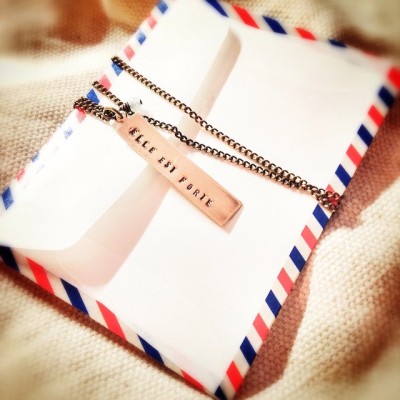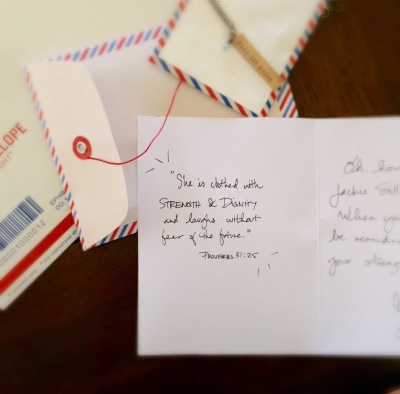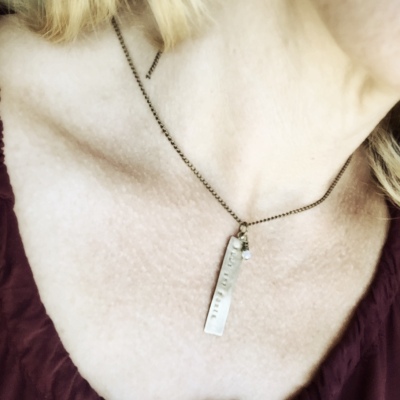A Husband’s Choice
My husband stood at the front of the hall, looking handsome in a dark jacket as he made last minute preparations for a ceremony he would soon officiate. The room was filled with about twenty formal dining tables, and guests were trickling in and finding their assigned seats. I found my place at table #5, glanced around the room and finally allowed my eyes to settle on the beautiful sunset coming to life outside the large windows. As I waited for the ceremony to begin, a lighthearted conversation developed between myself and a woman seated to my left. We mentioned the weather, commented on the decor, and complimented the other on her accessories.
And then the conversation shifted. You know what I am talking about: We unintentionally found ourselves in a meaningful conversation which pulled strangers beyond the guest list and into a spiritual and transformational moment.
Somehow in a conversation about why my husband and I relocated from California to Arizona, the topic of my infidelity came up. (This is where my closest friends shake their heads and mutter, “…of course it did.” ) My willingness to talk openly and be transparent about what has transpired in my life over the last year may seem like an oddity to some, but I have come to learn that while I am in the minority of those who talk about what we are going through, I am (sadly) not in the minority of those who have gone through it.
After I had shared with the woman at my table about my infidelity there was a little awkwardness. It happens. I am learning to be okay with that uncomfortable moment, because I remind myself that the person is processing what has been shared. Their inner conflict has little to do with me and much more to do with their own story. I don’t know their story, and I work hard to not guess what it may hold. I’ve received messages and have had conversations with people who have been unfaithful, people who have been betrayed, and adult children who have watched their parents navigate this path.
For this particular woman it took about ten minutes before she opened up and began to share. She leaned in and whispered, “How did your husband let it go?”
Following her initial question came her story. She shared the details of a familiar storyline that included betrayal and heartbreak. Even though I’ve had other interactions with women whose husbands have been unfaithful, I am always awestruck. It amazes me that this woman didn’t throw water in my face, accuse me of being a “woman-like-that”, and move to another table. What draws a woman who has been betrayed to seek community with a woman who once betrayed?
She related how her husband’s actions were still affecting her. It had been several years since the affair had happened and ended, and she couldn’t let it go. She couldn’t walk away from the wounded place of disbelief. And living in that place where she had been wounded had transformed her into an angry woman. She admitted that she treated her husband differently than every other person in her life.
She shared how slowly, over time her husband had become the target of all her disappointment. Her rage and her anger were consistently aimed at him. At one point she asked, “How did your husband stop that from happening? How did he move forward and forgive you?”
It was frightening to hear the details of the way her anger was affecting her marriage. It was even more frightening that she was asking me for input. She was asking me a new question. She was asking me how my husband had navigated this journey. My heart pounded a little differently as I told her simply and honestly, “I don’t know if I can answer that for you.”
And my answer made me feel a new wave of shame.
My selfishness did not end with the affair. As I had been so focused on my own discovery and path to recovery, I had failed to ask my husband a basic question. Why did his forgiveness come so quickly? We have talked about a lot of things he has experienced, but I had never asked him that particular question.
During my affair my husband was an unhappy man. He was lonely, and he felt an isolation he didn’t understand. For over half of his life I had been his partner and his best friend. During this brutal time he felt more alone than any other time in his life. He couldn’t comprehend what the root of the problem could be or what to do to bridge the ever widening gap between us. Even when we were together, I was absent. The more he would try to engage me, the more I would pull away.
After the affair was disclosed he saw hope. He immediately understood his own sense of isolation and abandonment. Things he was questioning and witnessing with his own eyes suddenly made sense. There was a freedom that came to him in the knowledge of the truth because it meant he was not losing his mind.
Anymore, my husband and I don’t spend a lot of time talking about what our marriage was like during the affair. I ache for my husband when he has a reminder of that time period. At this point in our marriage, there is only death in going back to that place. Life comes with everything that has followed since the affair.
This was an “after-the-affair” question; maybe it would be life giving to talk about it. It made me feel selfish that it hadn’t been discussed to the point in which I could answer the woman’s question easily, so my motivation for asking him was also to break any barrier that may still exist between us.
After a few days, I finally worked through my own pride, shame and guilt and breached the question to my husband, “How did you forgive me for everything so easily?” As soon as the words “so easily” had rolled off my tongue, I was filled with regret.
- How in the hell would I know how easy or how difficult it was for him to forgive me?
- Can I read his heart?
- Had I been assuming it wasn’t hard for him to forgive me?
The entirety of that conversation cannot be shared in one blog post, because honestly–it’s still happening. That was the first of an ongoing dialog about forgiveness.
My embarrassment over having used the term “so easily”, and my profuse apologies for assuming it was easy made us both aware that there is a difference between something being done easily verses something being done quickly.
Just because someone does something quickly and intentionally does not mean it was done easily.
In 2008 there was a video surfing the internet. It was filmed during a Women’s Collegiate 600 Meter race where Heather Dorniden was the favored frontrunner. During the first 200 meters of the race the commentators are generous in their appreciation of her style and the likelihood of her win.
Then Heather falls.
What happens to Heather immediately after she falls is almost not even on the screen. The cameras are moving with the runners who didn’t fall, but at the edge of the screen you can see Heather get up and start running immediately. She does not hesitate even for one minute.
She runs hard and fierce and she not only catches up to the other runners, but she passes them. She races like a winner, and rightfully so, because in a photo finish…she wins. Had she not gotten up, she would not have finished. Had she hesitated to get up for one second, she would not have won. Victory came to her because she responded quickly.
The day my husband learned his wife was guilty of the worst kind of betrayal, he had to make a choice: quick & hard or slow & harder. Because that’s one of the realities about an unforgiving heart. What starts as hard, will oftentimes become harder. And in the same way that hard can transition to harder, the difficulty continues to transform. Eventually slow & harder can evolve into something far worse: never & bitter.
When the word “bitter” comes up, my husband is quick to identify his desire to stay far away from bitterness as being a huge influence. He has difficulty remembering exactly what his thoughts were to break it down completely. He says it was love. He knows it was the Holy Spirit. Whatever the motivation, it appears as though my husband made a quick choice to forgive me on the first day he learned of my infidelity.
But I am not sure that’s what really happened.
The more I’ve considered the patterns of his life, the more certain I am that my husband made the choice to run a race with a grace-filled forgiving mindset long before his wife was unfaithful. Long before his wife had an affair he had allowed himself to be transformed into someone who would choose grace and forgiveness. The decision came quickly because the decision had already been made.
He was intentional with forgiveness because grace was part of the nature he had been striving towards long before it was needed. He was ready to run in the way that was most Christlike. He was ready to run in a way that would make us both stronger so we might both cross the finish line.








